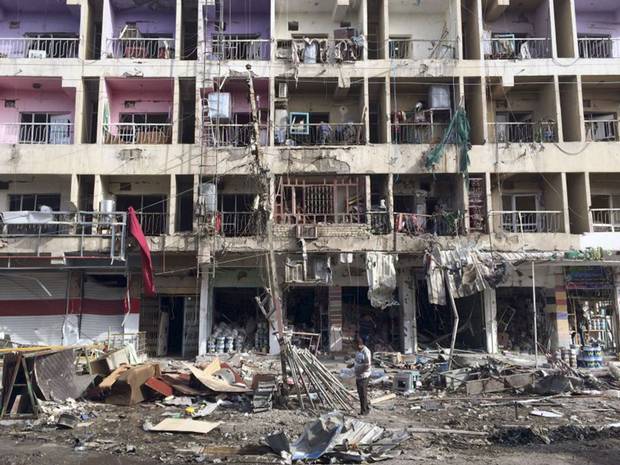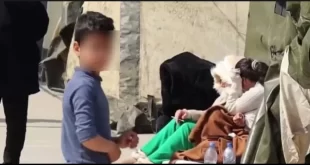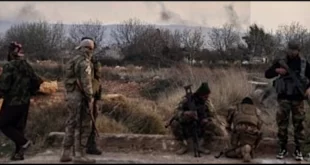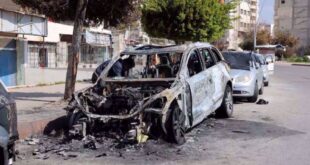
Jun 9, 2014, the Independent
Islamic fundamentalists have opened new fronts in their battle to establish an Islamic state across Iraq and Syria as they launch attacks in cities which were previously under the control of the Baghdad government.
A multi-pronged assault across central and northern Iraq in the past four days shows that the Islamic State of Iraq and the Levant (Isis) has taken over from the al-Qa’ida organisation founded by Osama bin Laden as the most powerful and effective extreme jihadi group in the world.
Isis now controls or can operate with impunity in a great stretch of territory in western Iraq and eastern Syria, making it militarily the most successful jihadi movement ever.
Led since 2010 by Abu Bakr al-Baghdadi, also known as Abu Dua, it has proved itself even more violent and sectarian than what US officials call the “core” al-Qa’ida, led by Ayman al-Zawahiri, who is based in Pakistan. Isis is highly fanatical, killing Shia Muslims and Christians whenever possible, as well as militarily efficient and under tight direction by top leaders.
In Iraq in the past four days, it has fought its way into the northern capital of Mosul, sent a column of its fighters into the central city of Samarra and taken over Iraq’s largest university at Ramadi, in the west of the country. In addition, it launched devastating bombings targeting Shia civilians in Baghdad that killed at least 52 people.
The creation of a sort of proto-Caliphate by extreme jihadis in northern Syria and Iraq is provoking fears in surrounding countries such as Jordan, Saudi Arabia and Turkey that they will become targets of battle-hardened Sunni fighters.
The well-coordinated attacks appear designed to keep the Iraqi security forces off balance, uncertain where the next attack will come. They started on Thursday when Isis fighters in trucks with heavy machine guns stormed into the city of Samarra, which is mostly Sunni but contains the golden-domed al-Askari shrine sacred to Shia. Destruction of this shrine by al-Qa’ida bombers in 2006 led to wholesale massacres of Sunni by Shia.
The Isis tactic is to make a surprise attack, inflict maximum casualties and spread fear before withdrawing without suffering heavy losses. On Friday, they attacked in Mosul, where their power is already strong enough to tax local businesses, from family groceries to mobile phone and construction companies. Some 200 people were killed in the fighting, according to local hospitals, though the government gives a figure of 59 dead, 21 of them policemen and 38 insurgents.
This assault was followed by an early-morning attack on Saturday on the University of Anbar at Ramadi that has 10,000 students. Ahmed al-Mehamdi, a student who was taken hostage, told a news agency that he was woken up by the sound of shots, looked out the window and saw armed men dressed in black running across the campus. They entered his dormitory, said they belonged to Isis, told everybody to stay in their rooms but took others away.
 An undated picture released by Iraq’s Interior Ministry claiming to show Isis leader Abu Bakr al-Baghdadi
An undated picture released by Iraq’s Interior Ministry claiming to show Isis leader Abu Bakr al-Baghdadi
One leader told female students: “We will teach you a lesson you’ll never forget.” They turned the science building into their headquarters, but may later have retreated. On the same day, seven bombs exploded in an hour in Baghdad, killing at least 52 people.
Isis specialises in using militarily untrained foreign volunteers as suicide bombers either moving on foot wearing suicide vests, or driving vehicles packed with explosives. Often more than one suicide bomber is used, as happened yesterday when a vehicle exploded at the headquarters of a Kurdish party, the Patriotic Union of Kurdistan in the town of Jalawla in the divided and much fought-over province of Diyala, north-east of Baghdad. In the confusion caused by the blast, a second bomber on foot slipped into the office and blew himself up, killing some 18 people, including a senior police officer.
The swift rise of Isis since Abu Bakr al-Baghdadi became its leader has come because the uprising of the Sunni in Syria in 2011 led the Iraqi Sunni to protest about their political and economic marginalisation since the fall of Saddam Hussein. Peaceful demonstrations from the end of 2012 won few concessions, with Iraq’s Shia-dominated government convinced that the protesters wanted not reform but a revolution returning their community to power. The five or six million Iraqi Sunni became more alienated and sympathetic towards armed action by Isis.
Isis launched a well-planned campaign last year including a successful assault on Abu Ghraib prison last summer to free leaders and experienced fighters. This January, they took over Fallujah, 40 miles west of Baghdad, and have held it ever since in the face of artillery and air attack. The military sophistication of Isis in Iraq is much greater than al-Qa’ida, the organisation out of which it grew, which reached the peak of its success in 2006-07 before the Americans turned many of the Sunni tribes against it.
Isis has the great advantage of being able to operate on both sides of the Syrian-Iraq border, though in Syria it is engaged in an intra-jihadi civil war with Jabhat al-Nusra, Ahrar al-Sham and other groups. But Isis controls Raqqa, the only provincial capital taken by the opposition, and much of eastern Syria outside enclaves held by the Kurds close to the Turkish border.
Isis is today a little more circumspect in killing all who work for the government including rubbish collectors, something that alienated the Sunni population previously. But horrifically violent, though professionally made propaganda videos show Isis forcing families with sons in the Iraqi army to dig their own graves before they are shot. The message is that their enemies can expect no mercy.
The violence continued yesterday as at least 18 people were killed in two explosions at the headquarters of a Kurdish political party in Iraq’s ethnically mixed province of Diyala. Isis claimed responsibility.
Most of the victims of Sunday’s attack were members of the Kurdish security forces who were guarding the office of the Patriotic Union of Kurdistan (PUK) party in the town of Jalawla.
The explosions were the latest in a show of strength by militants who in recent days have overrun parts of two major cities, occupied a university campus in western Iraq and set off a dozen car bombs in Baghdad.
Jalawla lies in disputed territory, and is one of several towns where Iraqi troops and Kurdish peshmerga regional guards have previously faced off, asserting their claims over the area. Both are a target for Sunni Islamist insurgents.
 Syria Support Movement solidarity with the Syrian people
Syria Support Movement solidarity with the Syrian people




